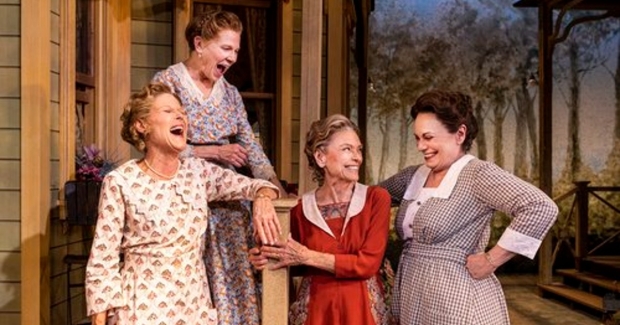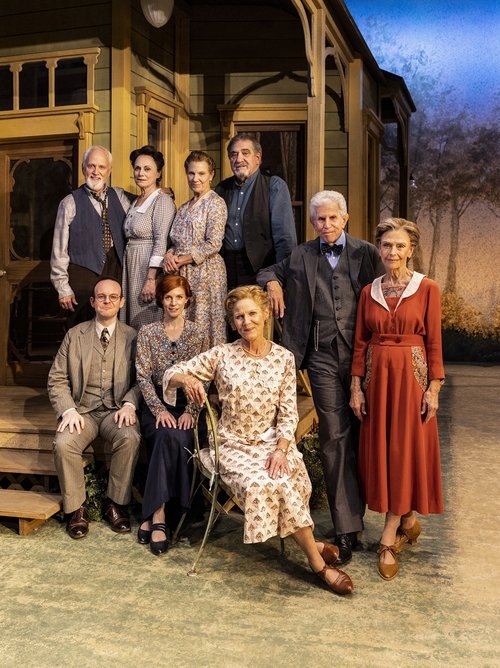Review: The Nostalgic Bubble of Morning's at Seven Has Burst
Paul Osborn’s 1939 comedy may have aged itself into obsolescence.

(© Maria Baranova)
We are all now aware of the anxieties and odd behaviors that spring up as a result of being trapped in social bubbles, but of course Americans have always found ways to keep themselves sequestered. Paul Osborn's 1939 comedy Morning's at Seven, consciously or not, is about people who hole up with each other for other reasons, including fear, laziness, gender roles, and emotional or financial security. The play fared well on Broadway in a 1980 revival (where it picked up three Tonys) and has been a hit in regional productions for decades, mostly because its gentle humor doesn't ask much of its audience and because it's a terrific vehicle for actors of a certain age to let audiences wax nostalgic as they ponder the (white) American family during "simpler" times.
The production that just opened at the Theatre at St. Clement's longs to immerse us in that part of the American mythos without troubling us about anything that has occurred over the past nearly two years. There are a host of seasoned actors here, including Patty McCormack, Dan Lauria, Tony Roberts, Alley Mills, and more, all of whom help breathe life into this aging comedy. But Morning's at Seven now seems so bereft of anything new to say, and so out of touch with today's America, that even its fine performances can't keep its nostalgic bubble from bursting.
Director Dan Wackerman leans heavily into the idea of giving us a solid, traditional play, starting with the set. Two finely constructed houses, both alike in insularity, stand mirroring each other in an unnamed American town in 1922 (set designer Harry Feiner goes for meticulous detailed realism, right down to the kitchenware we can see though the houses' windows). On one side lives Thor (Lauria), his put-upon wife, Cora (Lindsay Crouse), and Cora's unmarried sister, Arry (Mills), who has lived with them and driven Cora quietly crazy for the past 50 years.

(© Maria Maranova)
On the other side lives a third sister, Ida (Alma Cuervo), and her husband, Carl (John Rubinstein). Carl is prone to fits of existential dread, despairingly pressing his head against trees whenever he feels he's taken a wrong turn in life. Ever-anxious Ida is awaiting the return of her son, mama's boy Homer (Jonathan Spivey), and his squeaky-voiced fiancée, Myrtle (a hilariously endearing Keri Safran). A fourth sister, Esther (Patty McCormack in a stately performance), lives nearby with her intellectual husband, David (a haughtily aloof Tony Roberts), who refuses to associate with anyone in the family except for the self-questioning Carl. The rest of them, says David, are "morons."
It's easy to see why this gaggle of quirky characters has been popular with audiences for years. Throw in a few family scandals (a reneged promise of a dreamhouse; an affair between Thor and one of the sisters; an out-of-wedlock pregnancy), and you have modestly cheeky, low-stakes comedy. Lauria, a gently smoking pipe hanging from his mouth, creates a calming, masculine presence, and McCormack in an autumnal dress (costumes by Barbara A. Bell) rises above the mayhem with an effortless simplicity. Safran, as the perma-smiling, eager-to-please Myrtle, gets some of the show's biggest laughs alongside Spivey's neurotic Homer. Mills (Lauria's TV wife on The Wonder Years) is splendid as the sister nursing unfulfilled longing, while Cuervo's Ida spins into a nervous panic every time Carl wanders off to find out where his life went wrong.
Solid performances aside, the production missed an opportunity to open the play to broader interpretations by opting for traditional rather than more diverse casting, a decision that adds to the sense of the play being a relic. There is no good reason why this production should not have included actors of different races and ethnicities. Literalists would take issue with that, but they live on an isolated island in the past anyway, one that the modern theater has and should continue to set sail from if it wants to keep plays like Morning's at Seven from becoming completely obsolete.









